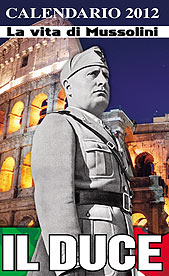
"I was born in that era and he put bread on the table," said the 78-year-old. "I cannot betray my culture."A 2012 calendar. This year will bring a new crop featuring the dictator.
Every year, around this time, Mussolini calendars appear in newspaper kiosks up and down Italy, offering a year's supply of photos of the fascist leader.
They are often tucked away with the specialist magazines, but according to the manager of one firm that prints them, they are much in demand.
"We are selling more than we did 10 years ago," said Renato Circi, the head of Rome printer Gamma 3000. "I didn't think it was still a phenomenon, but young people are now buying them too."
Sixty-eight years after the fascist dictator was strung up with piano wire from a petrol station in Milan following his crushing of Italian democracy, his racist laws and his disastrous alliance with Adolf Hitler, Mussolini has quietly taken his place as an icon for many Italians.
Among his adherents today are the masked, neo-fascist youths who mounted raids on Rome schools this autumn to protest against education cuts, lobbing smoke bombs in corridors and yelling "Viva Il Duce".
A masked mob that ambushed Spurs fans drinking in a Rome pub in November, was also suspected of neo-fascist sympathies. When Spurs played Lazio the following night, Lazio fans chanted "Juden Tottenham", using the German word for Jews in reference to the club's Jewish heritage.
But the cult of Il Duce has also slipped into the mainstream. The decision by a town south of Rome to spend €127,000 (£100,000) of public funds this year on a tomb for Rodolfo Graziani, one of Mussolini's most blood-thirsty generals, was met with widespread indifference.
Other more mundane examples include the leading businessman who proposed renaming Forli airport in Emilia Romagna – the region of northern Italy where the dictator was born – as Mussolini airport, or the headmaster in Ascoli Piceno who tried to hang a portrait of the dictator in his school.
The man who gets some credit for dusting off Mussolini's reputation isSilvio Berlusconi, who famously described the dictator's exiling of his foes to remote villages as sending them on holiday.
Berlusconi's subtle rehabilitation of Mussolini came as he brought Italy's post-fascists, led by Gianfranco Fini, into his governing coalition in 1994 and 2001, following the "years of lead" in the 1970s and early 80s, when neo-fascists and communist sympathisers battled in the streets.
"Today, Mussolini's racial laws against Jews remain an embarrassment, but people don't care about his hunting down anti-fascists," said Maria Laura Rodotà, a journalist at Italy's Corriere della Sera. "That became one of Berlusconi's jokes."
Admiration for Mussolini is common in Berlusconi's circle. Showbusiness agent Lele Mora, who is now on trial for allegedly pimping for the former prime minister, downloaded an Italian fascist song as his mobile ring tone, while Berlusconi's long-time friend, the senator Marcello Dell'Utri, has described Mussolini as an "extraordinary man of great culture".
After Mussolini's murder by partisans in 1945 – as the Allies pushed up through Italy – the country did not exorcise the ghosts of fascism, as Germany sought to. A 1952 law forbidding fascist parties or the veneration of fascism has never been seriously enforced.
"It was not used partly because banning parties was potentially anti-constitutional, and also due to a sneaking admiration for fascism," said James Walston, professor of politics at the American University of Rome.
Decades on, the memory of Mussolini as the strong man who put a post office in every piazza and made the trains run on time has been decoupled from the ideology of fascism, said writer Angelo Meloni.
"He is now a pop icon, an arch-Italian, a personality whose legend is linked to the years of consensus in Italy," he said. "Just as people who don't go to church like Padre Pio, so 90% of those who buy Mussolini calendars will never have voted for a fascist party," he said.
Gamma 3000 promotes Mussolini calendars on its website alongside ones featuring the Catholic saint and mystic Padre Pio, guerrilla leader Che Guevara, topless models and cute kittens.
But for Italy's modern neo-fascist groups, including CasaPound, Il Duce is still very much about ideology.
"Whoever buys the calendar admires his work – the two things cannot be separated," said the group's vice-president, Simone di Stefano.
"There is a need today for his politics, for someone who will put the banks and finance at the service of Italy," he said. "Youngsters who come to us already see Mussolini as the father of this country."
CasaPound's student offshoot organisation, Blocco Studentesco, is a mainstay in Rome youth politics, polling 11,000 votes in school council elections in 2009 and even enrolling the mayor of Rome's 17-year-old son, who was photographed on holiday in 2012 giving a straight-armed fascist salute with friends.
The well-to-do streets around Piazza Ponte Milvio, north of Rome's football stadium, are today plastered with posters and graffiti by numerous neo-fascist groups, including CasaPound, and the local bars have become a hangout for gangs of rightwing lads in regulation Fred Perry shirts and Ray-Ban Wayfarers.
"Many teenagers now avoid Ponte Milvio since the people who go there have shifted further to the right," said Rodotà.
Further down the road, the entrance to the stadium is marked by a massive fascist-era obelisk, still standing, with "Mussolini" written in huge letters down the front. Nearby, the bar run by Pasquale Moretti, where Lazio fans meet before games, contains a mini-supermarket of fascist memorabilia, from bottles of wine with Mussolini's portrait on the label, to fascist flags and T-shirts, and oil portraits of Il Duce.
"He built housing for workers, something no Roman emperor did," said Moretti. "How can I not respect that?"
The Guardian
No comments:
Post a Comment